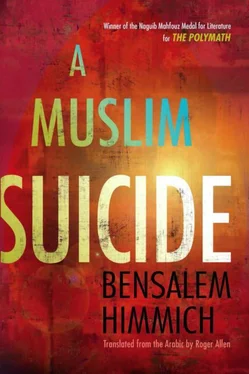I said nothing for a while as I tried to think of what to say.
"In view of your noble sentiments," I responded, "the appropriate answer involves adhering to the pledge you've already made and not giving way. Your noble status is one that I respect, and Baybars will never be able to do anything about it, however much he tries to interfere."
"I'm not worried about my own reputation. What bothers me is your position in Baybar's eyes. From now on, you're under my protection even more than before. Don't leave Mecca, or else no one can say what might happen. My protection only covers the city, not outside it, even Medina where the authorities are already furious with you."
"I already know that, Sir. And you can add the minister of Yemen, al-Hashwi, who loathes me, even though his master gives me all due honor and respect. God alone has the power and might!"
"My council has been purged of all those who resemble this stupid minister, chief among them being my chamberlain, `Abd al-Muhaymin al-Khazraji. Everyone opposed to you is also opposed to me. I'm on my guard all the time and never allow myself to slack off. I'm attaching three guards to you, who will guard you night and day. They'll bring you any news about Baybars and his spies. With God's help, they'll protect you against their evil intentions."
"I beg you, Sir, spare me guards and detectives. My reason for making such a request is that at some point everyone in life will meet their end. Fate does not brook any caution!"
"From one point of view you're right. But I'd remind you that we're all enjoined not to expose ourselves deliberately to perdition. Baybars will undoubtedly be on his way here to perform the pilgrimage very soon. He'll be bent on searching you out and bringing you before him. You know full well why."
"At that point I'll take all necessary precautions. I've a number of hiding places in the desert around those holy sites."
"But you'll need to stay well clear of the famous caves and the sacred sites. Make sure you choose somewhere that's known only to God and don't come back until the danger is past and the storm has blown over."
The muezzin now announced the call to evening prayer. My host insisted that I lead the prayer, so I did so. Once we had finished, he accompanied me to his garden. While we were walking, he asked me what was my dearest wish. I said nothing.
"Isn't it to have your wife join you here?"
"Of course!" I replied at once. "But how can that happen?"
"I'll send someone to ask Al-Mustansir to grant that favor. I think he can do it. If not, how can his caliphate possibly have validity and how can anyone from east to west swear fealty to it?"
At that point a strange idea occurred to me: could it be that the letter of fealty that I had written was merely a pretext the governor had used to respond to my obvious desire to bring my wife and very life, Fayha', to Mecca?
"In my view," I replied somewhat hypocritically, "it's not a good idea to involve the caliph in matters that are beneath his dignity. Maybe he can't be bothered…"
"To the contrary," he interrupted firmly, "I'll use this request to assess his prestige and rulership qualities. By the Lord of the Ka`ba Himself, the Creator of male and female, if he doesn't respond to my request and refuses my initiative, I intend to break my vows of fealty to him. Let me take the matter in hand, and we'll see what happens. Now let's go to dinner."
I reminded him that, in accordance with Sufi practice, I preferred to sleep on an empty stomach. Saying farewell, I departed.
Oh my, how that idea began to churn inside me; it seemed to have drifted up from some secret lair, from deep-buried recesses in my soul. Beginning with that very night it kept haunting me, seething and heaving, provoking all kinds of ideas and surmises. The only way I found of suppressing or pushing it all aside was by reciting intercessions and going out to perform the prayers and talk to people.
About a month later the governor called me to a meeting in his alcove within the sacred mosque. He told me that he had indeed sent someone to ask that my wife join me here. I acknowledged his gesture and thanked him profusely for it. We then both performed the afternoon prayer with the congregation. When the prayer was finished, the governor added a prayer that God would grant me my dearest wish before the beginning of the year's pilgrimage season.
I NOW SPENT THREE WHOLE MONTHS living on tenterhooks, all the while recalling my own share of this lower world and displaying my fervent love for it. A little while later Abu Numa was able to give me the glad news that his envoy had been successful with Al-Mustansir: my wife would soon be leaving by ship along with pilgrims from Tangier and Granada. From now on, in my prayers and devotions my only request was that God would grant her a safe passage and spare her the travails and dangers of the journey itself. I began to recall the days of my life that I had spend in her care and protection; glowing images suffused my sight and soul, full of light and emitting wafts of perfume and beautiful garlands of flowers. Clasping those thoughts to myself all day long was enough to bolster my heart long enough to endure the trials of waiting.
A month and a half went by. Such was my love for my wife and my yearning desire to see her again, she being mistress of my body and soul, that I counted the passage of time in heartbeats. I decided to bolster my patience by performing the minor pilgrimage and standing on the Mountain of Mercy, invoking all kinds of prayers that would engender a favorable response and good outcome. That is how I came to compose the Epistle at Arafa, all of it in accordance with the statements of various schools and accepted traditions. For students I convened a number of sessions on the topic, in which I expounded on the work's major themes and explained the work's goals. I pointed out that the process of standing at 'Arafa was a gesture of wisdom, not merely an act of worship. I summed up the whole thing by saying, "The day spent standing at 'Arafa represents continuation of the relationship, severance of the appurtenances of causality, departure from the humiliation of pernicious phenomena, and entry into the higher world by means of essence. It is there that one glimpses the first signs of the ultimate, is exposed to the fragrances of the good works of the one who gains cognizance so that he may perceive and be perceived."
The students made many copies of the Epistle and circulated it to pilgrims and people praying in the Great Mosque and at some of the entry gates. Some copies fell into the hands of the usual set of jurist pedants, who proceeded to read it with their feeble eyes and intellects, not to mention their poor and outmoded methodology. It managed, not surprisingly, to get on their nerves and provoke their extreme anger. They all went to see the governor to complain and showed him a copy of the Epistle, pointing out passages that they considered deviant and blasphemous. When the governor looked at the text for himself, he told them to stop disparaging a holy man of God. He likened them to someone whom I actually mention in the epistle itself, looking out on the world from a concave fortress so that all he can see is whatever is directly facing it. Hatred, the governor reminded them, only engenders troubles. He went on to suggest that they follow the path of tolerance rather than the opposite, of lofty goals rather than paltry ones. With that he sent them away, duly humbled. Someone whose information was entirely trustworthy shared this account with me, all of which only increased my admiration for the governor.
With the arrival of the month of Rajab I was hoping dearly for the fulfillment of that amazing event, than which there could not be anything sweeter and dearer to my heart: to see my wife standing before me, to hug and kiss her and share those bonds of marriage that God and religion have declared permissible. During that month, never a day passed without my washing myself in either the Jamal al-din or the Mayyanshi baths, putting on some perfume, and donning my very best clothes. I would leave it to Ghaylan and Yasir to clean the house and prepare for my reunion with my wife. I would then hire a camel and head out of Mecca to the north toward the port of Jedda. There I would ask for the captain of the boat in which my wife was traveling. No one knew of his whereabouts. I kept on searching and making inquiries, but without success. I even gave my wife's name to the person in charge of receiving pilgrims. When I eventually returned to the residence at night, my hopes dashed, I would start to panic. I endured a thousand kinds of agony, and only intercessions, dreams, and constant prayer enabled me to overcome them. Both Yasir and Ghaylan realized full well what I was going through. They both advised me to relax at home. They volunteered to take turns traveling to Jedda to check on things.
Читать дальше












